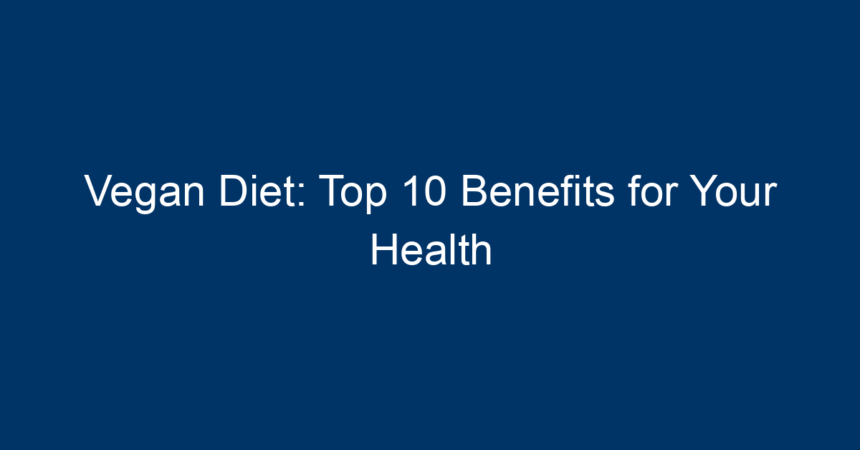In recent years, the vegan diet has gained tremendous popularity, drawing attention not only for its ethical implications but also for its numerous health benefits. Whether you’re considering a full transition to a vegan lifestyle or just contemplating incorporating more plant-based meals into your routine, understanding the health advantages associated with a vegan diet can motivate you towards healthier eating patterns. In this article, we will explore the top 10 benefits of adopting a vegan diet and how it can significantly enhance your overall health.
Understanding the Vegan Diet
Before diving into the benefits, it’s essential to understand what a vegan diet entails. A vegan diet excludes all animal products, including meat, dairy, eggs, and often honey. Instead, it focuses on fruits, vegetables, whole grains, legumes, nuts, and seeds. This dietary shift can profoundly influence your health and well-being.
1. Rich in Nutrients
One of the primary benefits of a vegan diet is its nutrient density. Plant-based foods are generally high in vitamins, minerals, and fiber, which are crucial for maintaining optimal health. For instance, fruits and vegetables are rich in antioxidants, helping combat oxidative stress in the body. A well-planned vegan diet can provide ample amounts of:
- Vitamins A, C, and E: Found in abundance in leafy greens and fruits.
- Fiber: Essential for digestion and found in legumes and whole grains.
- Folate: Vital for cell production, available in beans, lentils, and leafy veggies.
2. Weight Management
Adopting a vegan diet often results in healthier weight management. Studies have shown that vegans tend to have a lower body mass index (BMI) than those on omnivorous diets. The high fiber content in plant foods promotes satiety, helping you eat less without feeling deprived.
Tips for Successful Weight Management on a Vegan Diet
- Focus on whole foods rather than processed vegan options.
- Incorporate a variety of fruits and vegetables to keep meals exciting.
- Stay mindful of portion sizes, especially with high-calorie foods like nuts and avocados.
3. Heart Health
A significant benefit of a vegan diet is its positive impact on cardiovascular health. Research indicates that plant-based diets can lower cholesterol levels and blood pressure, reducing the risk of heart disease. The lack of saturated fats found in animal products, combined with the intake of heart-healthy foods such as oats, beans, and avocados, contributes to better heart health.
Enhancing Heart Health on a Vegan Diet
- Opt for whole grains and legumes as staple foods.
- Incorporate foods rich in omega-3 fatty acids, such as flaxseeds, chia seeds, and walnuts.
4. Lower Risk of Chronic Diseases
Numerous studies have shown that adhering to a vegan diet can lower the risk of chronic diseases, such as:
- Type 2 Diabetes: A plant-based diet can improve insulin sensitivity and lower blood sugar levels. The high fiber content helps regulate glucose in the bloodstream.
- Cancer: Certain studies suggest that vegans may experience lower incidences of certain types of cancer, likely due to higher intakes of antioxidants and phytochemicals found in plant foods.
5. Improved Digestion
The emphasis on high-fiber foods in a vegan diet does wonders for digestive health. Fiber promotes regular bowel movements, reduces the risk of constipation, and nourishes the beneficial bacteria in your gut.
Maintaining Digestive Health on a Vegan Diet
- Include a variety of fiber sources like beans, lentils, whole grains, fruits, and vegetables.
- Stay hydrated to enhance fiber’s digestive benefits.
6. Enhanced Skin Health
Many individuals following a vegan diet report improvements in their skin condition. This could be attributed to increased intake of vitamins and antioxidants from fruits and vegetables. Certain plant-based foods can help hydrate the skin and combat inflammation, potentially leading to clearer complexion and fewer breakouts.
Top Foods for Healthy Skin on a Vegan Diet
- Watermelon: Great for hydration.
- Carrots: Rich in beta-carotene, promoting skin health.
- Berries: Packed with antioxidants that combat aging.
7. Increased Energy Levels
Transitioning to a vegan diet often leads to higher energy levels. This boost can be attributed to the plethora of vitamins, minerals, and essential nutrients derived from whole plant foods, which fuel your body more efficiently than processed foods or animal products.
Ways to Boost Energy on a Vegan Diet
- Eat small, frequent meals to keep energy levels stable.
- Incorporate complex carbohydrates like quinoa, sweet potatoes, and brown rice for sustained energy release.
8. Environmental Benefits
While this article focuses on health benefits, it’s worth noting that following a vegan diet contributes positively to environmental health. The reduction in meat consumption can lower carbon emissions, water usage, and overall ecological impact. This connection can enhance your mental well-being, knowing that your dietary choices align with sustainable practices.
9. Ethical Considerations
Many choose a vegan diet due to ethical concerns regarding animal welfare. Knowing that your dietary choices promote compassion can play a significant role in enhancing your mood and overall mental health. Feeling guilt-free about your food choices contributes to a positive mindset and lifestyle.
10. Better Blood Sugar Control
Adopting a vegan diet can play a vital role in controlling blood sugar levels. The focus on whole foods and complex carbohydrates helps prevent spikes in blood glucose, promoting better regulation through fiber and plant-based nutrients.
Tips for Blood Sugar Control on a Vegan Diet
- Limit the intake of refined sugars and highly processed foods.
- Monitor carbohydrate intake, particularly for those with existing diabetes.
Conclusion
Transitioning to a vegan diet can provide an array of health benefits, from weight management to improved heart health and digestion. By incorporating a variety of whole foods, you can ensure that your body receives the necessary nutrients while promoting a sustainable and ethical lifestyle.
Actionable Insights:
- Start slowly by incorporating more plant-based meals into your week.
- Experiment with new fruits, veggies, and whole grains to keep your diet diverse and enjoyable.
- Educate yourself on meal planning and nutrition to make the transition smoother.
Embrace the journey of a vegan diet not only for your health but also for the well-being of our planet and its inhabitants. Every small step counts, making the world a healthier place for everyone.




